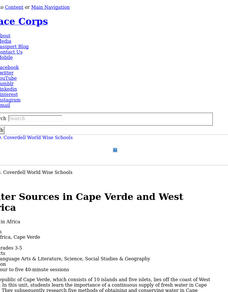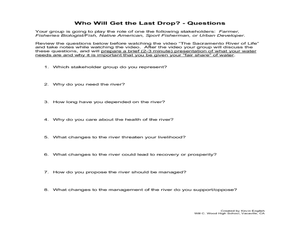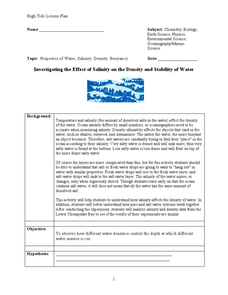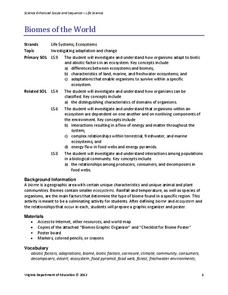Curated OER
For the Last 10,000 Years...
Students study the National Estuarine Research Reserve System and discuss why they have important cultural artifacts. In this estuarine weather instructional activity students use the Internet and complete a worksheet.
Curated OER
Water Sources in Cape Verde and West Africa
Learners analyze the importance of a fresh water supply in Cape Verde, researching five methods of obtaining and conserving water there. Students create and present displays demonstrating their understanding of the methods of water...
Curated OER
Characteristics of Arthropods
In this arthropods activity, learners will review arthropod exoskeletons, jointed appendages, molting, and types of respiratory structures. Students will also review arthropod senses, body systems, and reproduction. This activity has 6...
Curated OER
Rainwater Harvesting, A Practice for Puerto Rico?
Students identify the various sources of water in Puerto Rico. In groups, they research the various ways people in the country gather their water. They also analyze the reasoning behind water catchment systems to end the instructional...
Curated OER
Flatworms- Observations of a Live Planarian
In this flatworm learning exercise, students observe a flatworm in a petri dish. Students describe the flatwork and measure the planarian. Students complete the various charts about the movement and observations of the planarian.
Curated OER
The Romans: Public Health and Water
In this Ancient Rome worksheet, students read about the public health system of Ancient Rome: aqueducts, public baths and sewers.
Curated OER
Tracking the Salt Front
Students manipulate Hudson River salt front data from October 2004 -
September 2005 to locate the high and low points of the salt front for each month, They determine the range for each month, determine the modal range for each month,...
Curated OER
Lotic Environment
Students assemble a classroom river model as an example of a lotic system. They control and measure biotic and abiotic information for the in-class system and compare data with a lotic system in a natural environment.
Curated OER
Forming A Government
Students simulate being on an island after their ship has wrecked, or their plane has crashed. Food, fresh water, and shelter are in short supply. They must form a government, develop laws and penalties.
Curated OER
Who Will Get the Last Drop?
Students discuss the importance of California's water system. In this earth science lesson, student play the role of different stakeholders. They present a 2-3 minute argument on their group's perspective about their need for water.
Curated OER
Water Quality Monitoring of Natural Water
Students set up their own monitoring system. They collect samples from an appropriate sampling site. They analyze data and determine the water quality. They present their information to the class and draw a conclusion.
Curated OER
Great Lakes Food Web
Young scholars identify species and components of a Great Lakes food web. Using note cards, they place themselves in the correct order of the food chain based on the species present. They discuss what they believe happens to various...
Curated OER
Zebra Mussels
In this zebra mussels worksheet, 7th graders read an article about zebra mussel populations in United States' lakes and rivers. Students read about the negative effects and some positive results and then answer several questions about...
Curated OER
Designing a Study
Students explore features to consider when designing a scientific study. In this science research instructional activity, students examine different methods of data collection and consider which method would be appropriate for...
Curated OER
Eutrophication Experiments
Observe two different water samples and write down observations. Write a paragraph which predicts the relative amounts of nutrients, nitrates, and phosphates in the water samples. Compare water samples under a microscope.
Curated OER
Great Lakes Ecology
Students are able to use a secchi disk to measure the turbidity of water by determining the depth at which the sechi disk is no longer visible and using the data in a formula to quantify the results. They are able to use Vernier probes...
Curated OER
Ecosystems and Remote Sensing
Young scholars obtain remote sensing data to compare and contrast global biomass data with global temperature data.
National Wildlife Federation
Quantifying Land Changes Over Time in Areas of Deforestation and Urbanization
Is qualitative or quantitative research more convincing when it comes to climate change? In the eighth lesson during this 21-part series, scholars begin by performing a quantitative analysis of deforestation and urbanization. Then, they...
Curated OER
Investigating the Effect of Salinity on the Density and Stability of Water
Water with varying amounts of dissolved salt are dyed and then used to compare densities. The objective is to discover the effect of salinity, and therefore density, on ocean water on the stability of the ocean. Many branches of science...
Georgian Court University
Introduction to Marsh Ecology
Compare and contrast the characteristics of fresh and salt water marshes. After exploring the typical plants and animals found in each marsh type, participants use a set of flash cards to sort into fresh and salt water marsh life. Their...
Virginia Department of Education
Biomes of the World
Incorporate knowledge about biomes and ecosystems in multiple ways while encouraging creativity. Emerging ecologists collaborate and perform research to complete a graphic organizer about various biomes of the world. They conclude the...
Curated OER
Echinoderms
Echinoderm structure and characteristics are the focus of this reading comprehension and labeling instructional activity. Attractive diagrams and ample information make this a suitable homework assignment for your biology buffs when...
Curated OER
The Water Cycle
Your class sets up a mini water cycle model to examine the process. Then they watch an animation, following a water molecule through the cycle. A well-developed lab sheet guides learners through the lesson and a PowerPoint presentation...
K12 Reader
Water Carves the Land
What affect do bodies of water have on the world around us? Kids can find out by reading this passage. After reading, they answer five questions related to the text.

























